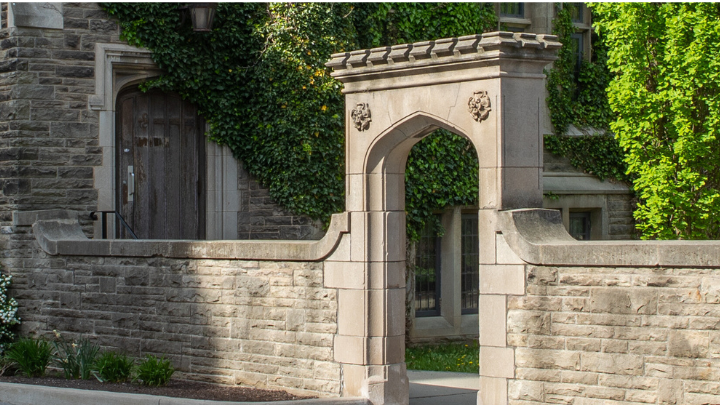PhD in Economics

PhD in Economics
Join a vibrant community of scholars at McMaster University, where faculty and graduate students collaborate to advance the field of economics. Our PhD in Economics program is designed to cultivate independent researchers who publish in leading academic journals, professional economists who utilize state-of-the-art methods to analyze complex economic phenomena.
Graduates of our PhD program emerge as skilled economists, ready to tackle real-world challenges.
You’ll have two primary career paths: many of our alumni secure academic positions as professors in economics departments or interdisciplinary settings, such as schools of public policy. Others find rewarding roles in high-quality research positions within government ministries, international organizations, and occasionally in the private sector.
Areas of Specialization
Students can specialize in a variety of fields, including: Econometrics, Growth and Monetary Economics, Health Economics, International Economics, Labour Economics, Population Economics, and Public Economics.
This breadth of focus allows you to tailor your studies to your interests and career goals.
Intimate Learning Environment
We admit only 5-8 PhD students each year, ensuring small class sizes that foster intensive interaction between students and faculty.
This close-knit environment promotes personalized mentorship and collaborative learning, enhancing your academic experience.
Research Facilities and Opportunities
McMaster is home to several cutting-edge research facilities that support your academic pursuits:
Secure Empirical Analysis Lab (SEAL) Learn More
Access a wealth of confidential micro-data for research in education, charities, and public services, with continuously expanding data holdings.
Statistics Canada Research Data Centre (RDC) Learn More
Utilize master files from a variety of Statistics Canada surveys and an increasing array of public-sector administrative microdata to support your economic research.
McMaster Decision Science Laboratory (McDSL) Learn More
As Canada’s first computer-mediated experimental economics laboratory, McDSL enables you to conduct controlled economic experiments across diverse fields.
Experience Beyond the Classroom: The WIL Advantage
The Work Integrated Learning (WIL) stream provides a unique opportunity to gain practical experience while pursuing your PhD in Economics. Students actively compete for and apply to positions worldwide, leveraging both departmental resources and personal networks.
Join the WIL stream and take your academic journey beyond the classroom, preparing yourself for a successful career in economics!
Global Opportunities
Positions can be held anywhere in the world, allowing you to broaden your horizons and gain diverse experiences in various economic contexts.
Skill Development
This hands-on approach not only enhances your resume but also equips you with valuable skills and insights that are essential in today’s competitive job market.
Networking
Engage with industry professionals and build connections that can open doors to future career opportunities.
Information Box Group
Take the Next Step
Explore our supervisors page to learn more about the faculty members who will guide you through your academic journey.
If you have any questions, don’t hesitate to reach out to us.
Program Information
Phase 1
The first phase is passing the comprehensive macroeconomic and microeconomic theory exams. To accomplish this, students must complete the following coursework:
- two microeconomics theory courses (ECON 721** and ECON 722)
- two macroeconomic theory courses (ECON 723** and ECON 724)
- two econometrics courses (ECON 761* and ECON 762)
- ECON 765 (as it is a required course)
- elective courses must be passed prior to writing comprehensive examinations in any area (see phase 2)
Students entering the PhD program from our MA in Economics program will already have completed the required courses and two electives; these students would require approximately six more electives. The Economics waiver exam may allow PhD students who enter the PhD program from another university to receive credit for ECON 761. Electives must be chosen so that the student satisfies the coursework requirements of his or her chosen fields for comprehensive exams (see the list below). Most electives are taken from courses offered by the economics department, but a student may also take up to two courses from other departments, with the approval of the graduate chair (economics) and the course instructor. Students in recent years, for example, have taken finance courses offered by the DeGroote School of Business, health-related courses offered by the Faculty of Health Sciences, and statistics courses offered by the Department of Mathematics and Statistics.
After the successful completion of the first year of coursework, comprehensive exams in micro and macro theory are typically given in May or June.
Phase 2
The second phase involves passing comprehensive exams in two areas of specialization and writing a research paper. The field examination committee may require that candidates complete specific courses before taking these exams. Below are the typical areas of specialization and the typical courses required for each. A graduate chair may, however, permit additional specializations in areas where the department has a research strength provided they are based on courses offered by the department.
The fields currently available are:
- Econometrics
- Experimental Economics
- Growth and Monetary Economics
- Health Economics
- International Economics
- Labour Economics
- Macroeconomics
- Microeconomics
- Population Economics
- Public Economics
Field exams are normally written after the second year of coursework has been successfully completed. Candidates have two chances to pass each comprehensive exam. Within 18 months of starting the program, students must pass the micro and macro theory comprehensive exams. The exams must be completed within 24 months of beginning the program. Within 27 months of entering the doctoral program, the student must complete a research paper. The research paper will be presented in the Fall term during the PhD workshop discussed below. The research paper must be accepted by the supervisory committee.
Phase 3
The thesis is the third phase. At this point, students may choose to enroll in additional courses if they are relevant to their proposed research. With the approval of the Graduate Chair, up to four half courses may be taken outside of the department. In addition to writing a thesis and taking courses, students must achieve the Active Researcher Milestone which involves participating in the department’s research activities (for example, by attending seminars, PhD workshops and meeting with visiting speakers) and regularly presenting their research. The Active Researcher Milestone must be achieved annually until graduation.
At this stage, students are required to complete the following seminar courses. Students who have passed all their comprehensive examinations should register for ECON 798 in the Fall term that immediately follows and present the research paper. Doctoral students typically take a total of 12-14 graduate courses at this university.
ECON 798: Workshops in Economics I
ECON 799: Workshops in Economics II
Co-op Option
Students in the PhD program who have successfully completed the comprehensive examinations may apply for the co-op option associated with this degree program. The number of students who will be accepted will be small and will depend on available placements. To complete the PhD co-op option, the student must work a total of eight months in either one or two placements and successfully complete both ECON 796 Economics Co-op Work Term I and ECON 797 Economics Co-op Work Term II.
Note
*A student who has a particularly strong background in econometrics can elect to write the econometrics waiver exam. Students who pass the waiver exam are allowed to replace ECON 761 (term 1 of econometrics) with an elective course. These students take ECON 762 in term 2 and complete the econometrics project. Credit for ECON 761 will appear on their transcripts.
**All students registering in ECON 721 (Micro Theory 1) or ECON 723 (Macro Theory 1) are encouraged to take the mathematics preparation course ECON 765, an intensive ten-day refresher course in mathematics (MATH CAMP). Math camp is given in August, prior to the start of regular graduate courses for the fall term. After the completion of this course, students are tested regarding their mathematics preparation. The course has two parts. Part I covers topics related to ECON 721-Micro Theory I and part II covers topics related to ECON 723-Macro Theory I and matrix algebra. Each part has its own final exam. Students registered in ECON 721(ECON 723) must write the exam related to part I (part II). A student’s score on the part I (part II) exam counts as 10% of the student’s final grade in ECON 721-Micro Theory I (ECON 723-Macro Theory I).
***Incoming students are strongly encouraged to enroll in ECON 4T03 so they are well prepared for first term micro.
The application portal opens on November 15th and closes on January 28th.
Learn more about the graduate studies application process and how to apply.
As a minimum, a standard Canadian entrant into our PhD program will have a Master’s degree in economics from a recognized university and will have maintained B+ average in their master’s study. We emphasize that these are minimum standards; those admitted typically have stronger academic records.
Students from foreign universities are expected to have equivalent backgrounds. Although equivalency is difficult to determine, here are some guidelines for a few countries from which we commonly receive inquiries:
- India: First-class standing for the Bachelor’s degree and upper-second-class standing for the Master’s degree.
- Bangladesh and Pakistan: First-class standing in both the bachelors and master’s degrees.
- China: A four-year degree with an average of at least 85%. The subject area must be ECONOMICS, not business. Strong skills in mathematics and statistics/econometrics are expected.
A student whose native language is not English, and who has not completed an English-language degree in a predominantly English-speaking country, must submit a TOEFL or IELTS score. The minimum acceptable TOEFL score for the Dept of Economics is 580 (237 on the computerized exam; 92 iBT); the minimum acceptable IELTS score is 6.5 with a minimum score of 5.5 in each category.
If you have any questions email them to econgrd@mcmaster.ca. Please be patient all emails will be answered.
**If your transcript states the medium of instruction was English or you submit a letter with your application from the University stating your medium of instruction was English then that will waive your ELP requirement and a test result will not be required**
Please note if you submit a score lower than 6.5, your application will not be reviewed. It is imperative that you meet the testing requirements noted above.
Required Document Checklist
- Application Form and Fee
- Two letters of reference
- Academic transcripts
- Statement of interest
- Writing Sample (Paper or Essay – there is no minimum words and it must be single author)
- CV/ Resume
Applicants are required to provide the names and contact information of two academic references. These references are to come from instructors most familiar with your academic work. Referees will be contacted via our electronic referencing system, references uploaded by the applicant will not be accepted. If a referee is unable to use the electronic referencing system they may email to econgrd@mcmaster.ca.
Fees
Information on Graduate Program fees can be found on the Office of the Registrar website.
Financial Aid
Internal
Students to whom we offer admission are automatically considered for financial assistance – no special forms need be filled out. Funding is awarded on academic excellence and the availability of funds. Funding is open to all domestic and international students.
All students admitted to the PhD program are offered two forms of financial assistance. The first is a Teaching Assistant (TA) position, which normally requires the student to perform 130 hours of marking or tutoring in each of the fall and winter terms. The second is scholarship support. In addition, many upper-year PhD students receive support in the form of a Research Assistantship (RA) in lieu of a TA, in which they work on a research project with a faculty member.
The minimum annual financial assistance provided to a PhD student is $17,500 during each of first four years of doctoral study. If a student’s study extends beyond four years, financial assistance as a TA or RA may be available, but it is not guaranteed.
Finally, in addition to the financial assistance provided in a letter of offer, students are eligible for TA and RA positions during the spring and summer terms, which provides support above that available during the Fall and Winter terms.
External
Trudeau Scholarship: Students in the 1st or 2nd year of the doctoral program or those applying to the doctoral program are eligible. View more information regarding eligibility and the application process.
Additional information on external scholarship support can be found at the following sites:
Resources
Quick Links

Graduate Supervisors Learn More
Find a graduate supervisor in your area of interest.

Research in Economics Learn More
Learn more about our recent and ongoing research projects.

Graduate Courses Learn More
View our graduate courses and course descriptions.
Contact Us
Cynthia Zhao
Graduate Administrative Assistant
Email: econgrd@mcmaster.ca
Office Location
Department of Economics
Kenneth Taylor Hall, 426
1280 Main Street West
Hamilton, Ontario, Canada
L8S 4M4
Office Hours
Monday – Friday:
9:00AM – 12:00PM & 1:00PM – 4:00PM
